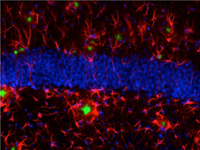NEUROPROTEOMICS AND SIGNALING OF BRAIN DISORDERS
Department: Neuroscience
Research subject
The team is developing a neuroproteomic project that has two main objectives: i) to characterize the signaling networks associated with several serotonin receptors and their role in various neurological and psychiatric disorders (mood disorders, schizophrenia, Alzheimer's disease, neuropathic pain), ii) to identify biomarkers of neurological disorders and determine their impact on these diseases. It is based on a multidisciplinary strategy based on (phospho)proteomic approaches associated with biochemical, electrophysiological and behavioral studies.
Our efforts focus on three serotonin receptors, the 5-HT2A, 5-HT4 and 5-HT6 receptors.
The 5-HT2A receptor is a major target of antipsychotics and psychedelic hallucinogens such as LSD. This receptor interacts with another antipsychotic target, the metabotropic glutamate mGlu2 receptor, to form heteromers that play a key role in the therapeutic response to antipsychotics. We are investigating the signaling mechanisms of 5-HT2A/mGlu2 heteromers and their impact on synaptic transmission and plasticity.
The 5-HT4 receptor, which exerts pro-cognitive effects and promotes the non-amyloidogenic cleavage of the amyloid precursor protein (APP) and thus prevents the accumulation of amyloid peptide in senile plaques, is a potential target to slow down the progression of Alzheimer's disease and alleviate associated cognitive symptoms. We are characterizing the signaling mechanisms involved in the non-amyloidogenic cleavage of APP and study the impact of the receptor on the evolution of the disease in preclinical models. In line with the role of the 5-HT4 receptor in the maturation of the enteric nervous system by the gut microbiota, the team recently initiated a project to characterize the impact of the microbiota on the development of Alzheimer's disease.
The 5-HT6 receptor plays a key role in neuronal development and is a promising target for treating the cognitive symptoms of Alzheimer's disease and schizophrenia. We are looking for novel receptor-mediated signaling pathways involved in neuronal differentiation, synaptogenesis and cognition, which are potential targets for the treatment of cognitive impairment in dementia or psychoses. In collaboration with chemist teams, we participate in the development of new compounds targeting 5-HT4 or 5-HT6 receptors (or both receptors) and the characterization of their therapeutic potential.
Our work on biomarkers is currently focused on the search for prognostic biomarkers of multiple sclerosis and the study of the impact of a panel of biomarkers identified in the cerebrospinal fluid by quantitative proteomics on the progression of the disease.
Team
Major publications
- Conejero I, Collombier L, Lopez-Castroman J, Mura T, Alonso S, Olié E, Boudousq V, Boulet F, Arquizan C, Boulet C, Wacongne A, Heitz C, Castelli C, Mouchabac S, Courtet P, Abbar M, Thouvenot E. Association between brain metabolism and clinical course of motor functional neurological disorders. Brain. 2022 Sep 14;145(9):3264-3273. doi: 10.1093/brain/awac146. PMID: 35445242.
- Fumagalli A, Heuninck J, Pizzoccaro A, Moutin E, Koenen J, Séveno M, Durroux T, Junier MP, Schlecht-Louf G, Bachelerie F, Schütz D, Stumm R, Smit MJ, Guérineau NC, Chaumont-Dubel S, Marin P. The atypical chemokine receptor 3 interacts with Connexin 43 inhibiting astrocytic gap junctional intercellular communication. Nat Commun. 2020 Sep 25;11(1):4855. doi: 10.1038/s41467-020-18634-y. PMID: 32978390; PMCID: PMC7519114.
- Berthoux C, Hamieh AM, Rogliardo A, Doucet EL, Coudert C, Ango F, Grychowska K, Chaumont-Dubel S, Zajdel P, Maldonado R, Bockaert J, Marin P, Bécamel C. Early 5-HT6 receptor blockade prevents symptom onset in a model of adolescent cannabis abuse. EMBO Mol Med. 2020 May 8;12(5):e10605. doi: 10.15252/emmm.201910605. Epub 2020 Apr 24. Erratum in: EMBO Mol Med. 2022 Sep 7;14(9):e16481. PMID: 32329240; PMCID: PMC7207164.
- Pujol CN, Dupuy V, Séveno M, Runtz L, Bockaert J, Marin P, Chaumont-Dubel S. Dynamic interactions of the 5-HT6 receptor with protein partners control dendritic tree morphogenesis. Sci Signal. 2020 Feb 11;13(618):eaax9520. doi: 10.1126/scisignal.aax9520. PMID: 32047117.
- Murat S, Bigot M, Chapron J, König GM, Kostenis E, Battaglia G, Nicoletti F, Bourinet E, Bockaert J, Marin P, Vandermoere F. 5-HT(2A) receptor-dependent phosphorylation of mGlu(2) receptor at Serine 843 promotes mGlu(2) receptor-operated G(i/o) signaling. Mol Psychiatry. 2018 Jun 1
NEUROPROTEOMICS AND SIGNALING OF BRAIN DISORDERS
Department: Neurosciences






